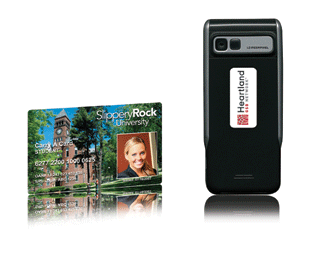Tomorrow’s campus card will focus more on identity than the credential
By Cindy McCall, Vice President of Marketing, The CBORD Group Inc.
In five years, a campus card will be much more than a physical card. Mobile and other virtual extensions of the campus card that are seen as cutting-edge today will be expected as standard offerings. These extensions will pave the way for campus card programs that put more focus on the identity than on the credential.
For security, this may mean using specialized credentials to gain access to residence halls, which are different than those used to get into the lab and also different from those used to access meal plans. The technology behind the applications may be contactless, biometric, cellular, WiFi, magnetic stripe, Near Field Communications, or all of the aforementioned tied to a single identity.
Hybrid cards to support this technology are in use today. North Carolina State University (Raleigh, NC) now has a card that supports two magnetic stripes, proximity, and iCLASS on a single card. In the next several years, more colleges and universities may employ similar strategies to meet constantly evolving PCI requirements.
When the card is expanded into other applications like parking, mass transit, and others, even more flexibility will be needed to remain PCI compliant. The system behind the ID card will need to be robust enough to support all of these credentials simultaneously for a single identity.
One card with many credentials for a single student, staff member, or patron will be complemented by online smart phones, tablets, and the web. Students will be able to easily add credentials to their cards and phones using specialized applications that are downloaded when needed.
Mobile credentials, in particular, will gain prominence. According to a 2012 Pew research study, 77% of teens aged 12-17 carry a cell phone of some kind. Of those aged 14-17, 31% carry a smart phone—and they use them for everything from texting their friends to doing their homework.
In five years, students will get into their residence hall rooms by sending a text message, opening an app and presenting their phones to the reader, or even scanning a QR code. A metal key isn’t going to cut it anymore, with parents and administrators more focused on residence hall security than ever before. CBORD has many customers already using these and other mobile solutions to extend their campus card services, including NFC, text-based access and spending, mobile account management, and more.
And it’s not just access control that will go mobile. Just as we often expect all merchants to accept credit cards, tomorrow’s students will feel the same about smart phone-based payments. Instead of reaching for their wallets at a register, vending machine, or laundry machine, students will reach for their phones to securely access their campus card funds.
In five years the campus card will be more convenient and secure than ever before—and we will all reap the benefits.
About the AVISIAN Publishing Expert Panel
At the close of each year, AVISIAN Publishing’s editorial team selects a group of key leaders from various sectors of the ID technology market to serve as Expert Panelists. Each individual is asked to share their unique insight into what lies ahead. During the month of January, these panelist’s predictions are published daily at the appropriate title within the AVISIAN suite of ID technology publications: SecureIDNews, ContactlessNews, CR80News, NFCNews, DigitalIDNews, ThirdFactor, RFIDNews, EnterpriseIDNews, FinancialIDNews, GovernmentIDNews, HealthIDNews, FIPS201.com, IDNoticias es.




